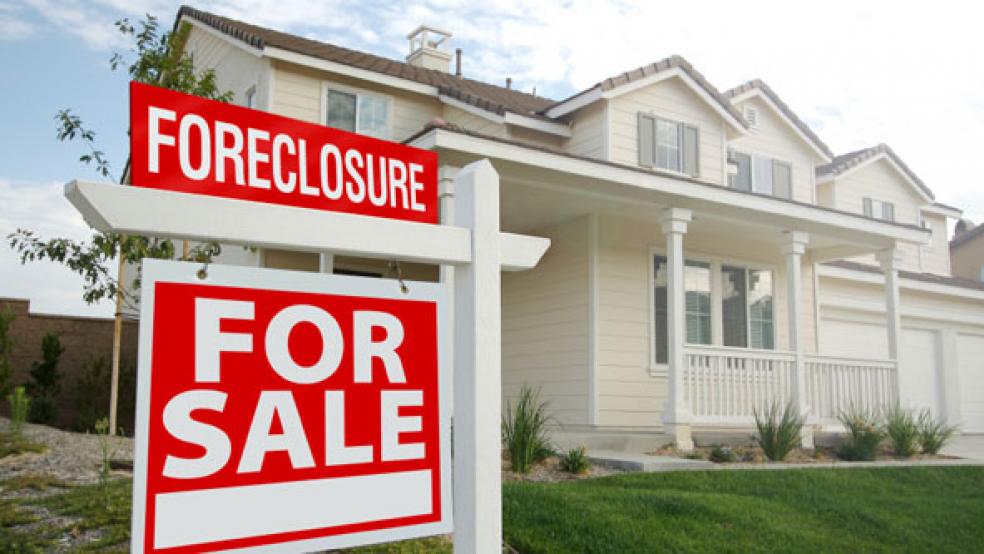The $25 billion deal struck with the nation’s five biggest mortgage servicers is no cause for celebration. At its best, the agreement presents the White House with a politically pleasing sound bite. In announcing the settlement, President Obama promised voters that it would “deliver some measure of justice for families that have already been victims of abusive practices.” Unhappily, that measure of “justice” is offset by the very injustices behind the deal. While homeowners who bought properties within their means and have paid down their mortgages will get nothing from the deal, others who borrowed more than they could afford on overvalued properties, and who stopped making their payments, will get a windfall.
Just to be clear: the banks made foolish (sometimes cynical) mortgages at the height of the real estate bubble, and eager homebuyers accepted those loans. Many had come to see houses as unbeatable investments; cheap money and ever-rising prices fueled enthusiasm, and speculation. In the collapse that followed, the banks responded to the avalanche of foreclosures with sloppy paper work and incomplete record-keeping. To compensate for this misbehavior, banks will pay some 750,000 people who lost their homes through faulty foreclosures approximately $2,000.
This appears a reasonable penalty, especially if it staves off massive litigation that could forever postpone a bounce-back in home buying. But, it needs to be said - nearly all the foreclosures were justified; there have been few instances in which a homeowner current on his payments was tossed from his house. Generally, those being foreclosed upon were one to two years behind on their payments. While many have pictured the banks as eager to foreclose, the opposite is true. In foreclosure, no one wins: the emptied house immediately plummets in value and the bank takes a large loss.
The Obama administration was eager to clinch this deal because its numerous other approaches to boosting the housing market have conspicuously failed, and the president needs to do all he can to prop up the economy before he runs for reelection. So driven was the White House to put a deal before voters that they removed an obstacle to the settlement – New York Attorney General Eric Schneiderman – by elevating him to a nifty and visible spot in the administration. In his new role as top cop investigating mortgage-backed securities fraud, Mr. Scheiderman can pursue the kind of crowd-pleasing bank bashing that he was loathe to sacrifice on the altar of the 50-state settlement.
New York attorneys general have a history of levitating their careers through pursuit of Wall Street scoundrels; Mr. Schneiderman’s personal ambitions are unchecked. He even got to sit behind Michele Obama at the State of the Union address!
The White House hopes that redirecting $25 billion from bank shareholders to underwater homeowners will help put a floor under still-sliding house prices. (About $17 billion will go to loan modifications.) Another likely deal, with the next nine largest mortgage providers, has sapped further funds from the industry as those institutions have reserved against a possible accord. In the real world, the drain of capital from these institutions that might step forward to finance new home purchases has helped keep a lid on a housing recovery. Moreover, though the agreement resolved certain outstanding legal problems, more are sure to come – from Mr. Schneiderman, among others. That will continue to keep mortgage providers in a defensive crouch, reluctant to grow their balance sheets.
“Only fools meet their financial commitments; the non-payers are the truly enlightened.”
Possibly the worst aspect of the settlement is that its terms might encourage “homeowners to default in the hopes of getting aid,” as described by the New York Times. That will surely gum up a recovery.
The one possible positive of the accord is that foreclosure activity, which took a sharp dive when the robo-signing scandal broke in late 2010, will revive, and begin to clear the market of the “shadow inventory” of homes that are behind in their payments and hanging over any recovery. As harsh as the process is, only until that mountain of available product disappears will supply and demand begin to converge.
The worst aspect of this agreement is the message that “only fools meet their financial commitments; the non-payers are the truly enlightened,” as bank analyst Dick Bove recently wrote in a note to clients. Mr. Bove is especially horrified that in forcing the banks to renegotiate loans, “the government has taken away the banks’ property rights; rights thought by many to be the basis of capitalism.” Given the damage done to millions of Americans who lost their jobs because of the financial crisis, few may agree that those rights should be protected.
Still, Americans revolted against bailouts of banks and auto companies who got into trouble because of bad management and stupid investments. The same voices should decry this latest government rescue. About one million out of the country’s 75 million homeowners (1.3%) will benefit – those who the president describes as “hardest-hit.” What he really means is those who got in the farthest over their heads. A New York Times article describing the settlement highlighted a homeowner, Carlos Sandoval de Leon, who owes Wells Fargo $662,000 on a brownstone in Brooklyn. According to his biography posted online, Mr. de Leon is an accomplished artist with a master’s degree from Columbia University. Is this someone who deserves help? Isn’t a highly educated person who borrows that rather large sum of money presumed to be a responsible citizen?
President Obama said in announcing the pact, “No compensation, no amount of money, no measure of justice is enough to make it right for a family who’s had their piece of the American dream wrongly taken from them.” The families who didn’t win this particular government lottery might disagree.






